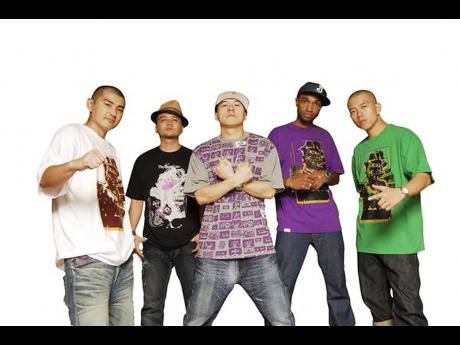International Reggae Day June 1, 2015 - Salute to Sound Systems

Wherever Jamaicans have travelled, sound systems have been part of their luggage as an integral feature of Jamaica's culture since the 1950s. Known as the 'talking Gleaner' in reference to its media function, according to Jamaica Sound System Federation (JSSF) president Tony Myers, "Before dancehall, reggae, rocksteady or ska, sound systems provided the primary source of entertainment and community in Jamaica and the sound system has been integral part of Jamaican life, both in Jamaica and abroad, since the 1950s."
This year's International Reggae Day (IRD), celebrated annually on July 1, salutes the Jamaican sound system movement for its pioneering impact on the development and internationalisation of Jamaican music and culture. In addition to dances, the sound system will be incorporated as a session theme for the annual IRD Kingston Conference at The Jamaica Pegasus hotel, New Kingston, starting at 8:30 a.m. IRD 2015 Awards will be presented to iconic Jamaican sound system innovators King Jammy, Stone Love Movement, Merritone Music, Prince Buster's Voice of the People, the late Louise Fraser Bennett, and the Jamaica Sound System Federation on behalf of the entire sound system movement, as well as Japanese sound system Mighty Crown.
The first Jamaican record producers - Prince Buster, Coxson Dodd (Studio One) and Duke Reid (Treasure Isle) - were sound system owners, commissioning recording sessions to ensure a supply of exclusive tunes to dominate the dancehall, which, at the time, was a place where all music was played. Because sound system dances were one of the few things poor people could call their own, they became central to downtown life in Kingston. Once producers started making records for sale, they would test new styles out on their sound system, and nearly every evolution in Jamaican music has been a result of competition between sound men to find something new to pull in the crowds.
UK Urban Music
In the United Kingdom (UK), the sound system was central to the start of the Notting Hill Carnival and proved crucial to the development of UK urban music, as outfits like Soul II Soul in London and The Wild Bunch in Bristol began life as local sound systems. In New York, hip hop grew out of a sound system set up by Jamaican DJ Kool Herc, as he brought Kingston dancehall culture to American music.
The BBC documentary The Story of Reggae - Sound Systems opined that "the only way to listen to reggae is at a sound system. Ideally, this would be at an open-air lawn in downtown Kingston, where it's 80 degrees at 2 a.m. and the bassline vibrates your bottle of Red Stripe, but a church hall in Bristol or a house party in Birmingham will do. The whole point is you're packed in with like-minded people; you have ownership of the music; the rig is such that you feel it before you hear it; the deejay is vibing up the crowd; and every killer tune brings a noisy reaction."
The IRD Kingston Festival celebrations will launch on June 30 with a Countdown Dance at the Rose Town Community Centre, 159 Spanish Town Road, Kingston, hosted by JamOne and endorsed by the JSSF and Jamrock Summer. Guest selectors are Winston Blake from the world's oldest active sound, Merritone Music, celebrating their 65th anniversary since its launch in 1950. Guest selectors will include UK selector MixMasterJay and there will be an appearance by IRD ambassador Protoje.
The IRD concert on July 1 at the Countryside Club will feature King Jammy mixing live to open the IRD stream on www.ireggaeday.com. "Countryside Club is pleased to host IRD Festival celebrations as part of their Red Stripe Beer Wednesdays, with drink specials to add to fan experience," stated Countryside's manager, Marcia Lawrence. .
Celebration Dance
Closing out the IRD Kingston Festival on July 2 will be the final sound system celebration dance, hosted by JamOne on the lawn at Countryside Club. The featured selector is Stone Love founder Winston 'Wee Pow' Powell, recently awarded the Order of Distinction by the Jamaican Government, alongside guest sound system and radio selectors.
IRD will also recognise the contribution of Prince Buster, Louise Frazer-Bennett and Mighty Crown to the Jamaican sound system movement. Cecil Bustamente Campbell, OD, aka Prince Buster, was educated in the sound system movement working with the likes of Tom 'the Great' Sebastian and Clement 'Sir Coxson' Dodd before launching his own Voice of the People sound system. In time, it became a worthy rival to the sound systems of Coxson and Duke Reid's Trojan Sound.
The late Louise Frazer-Bennett was a titan in Jamaica's sound system movement in the 1990s and a founding member of the first Sound System Association of Jamaica (SSAJ), for which she was public relations manager. She had a hand in the careers of Wayne 'Sleng Teng' Smith, Tenor Saw, Captain Barkey and Wickerman, Ghost and Culture, Charlie Chaplain and Junior Reid, as well as Ninja Man and Bounty Killer.
The IRD Award
Building on the work began by the SSAJ, the JSSF is a registered non-profit in Kingston developing and promoting sound system culture worldwide with the objective of providing a supporting voice for sound system participants. The IRD award presented to the federation will be a symbolic recognition of all Jamaican sound systems which have contributed to the movement over the past 65 years.
Mighty Crown is the most successful non-Jamaican sound system in the world. Founded in 1991 by friends from Yokohama, Japan, Mighty Crown gradually got their fame by playing at clubs and by selling self-produced mix tapes throughout Japan. After building their sound system in 1994, they started clashing with other Japanese sound systems and became the undisputed and undefeated sound clash champion in Japan in 1998.
From they started playing, Masta Simon, Sami-T and other members of Mighty Crown always aimed to break outside Japan. They started living in the United States from the early '90s and gradually learned the Jamaican language and the dancehall culture by hanging out in studios, record shops and in the streets of Brooklyn, New York. They started playing at local clubs in Brooklyn and Manhattan around 1992 and eventually went to World Clash '99 held in Brooklyn. They defeated sounds from Jamaica and the United States and became the first Japanese sound to get the World Clash trophy.
Read More...http://jamaica-gleaner.com/article/entertainment/20150629/intl-reggae-day-salutes-sound-systems






Add new comment